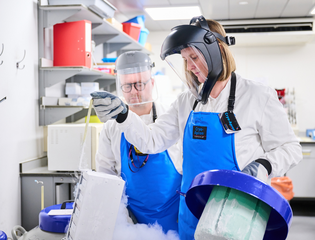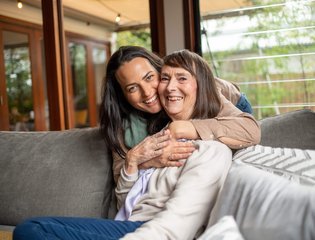BRCA Gene Faults: Everything you need to know
Have you heard of BRCA genetic mutations?
What is BRCA1/ BRCA2?
Our genes are instructions that spell out how to make proteins, which are the building blocks of our body. They are the instruction manual that defines how our bodies work. All cells have two copies of a gene, one from each parent. So a mutation, or spelling error, in one of these genes means that a cell only has one good copy. As a result, if that cell should suffer a mutation in the one good copy (through chance, or environmental factors) the gene can no longer do its job.
In the case of BRCA1 and BRCA2, these genes help our bodies control cell growth and so help to prevent cancer. We all have BRCA1 and BRCA2 genes. They are called tumour suppressor genes and their job is to produce a protein that repairs damage in cells and prevents them from growing too rapidly. Mutations in these genes are like spelling errors in the instruction manual. They alter the function of the gene and stop the protein from working. This can cause cells to become abnormal and grow in an uncontrolled way. The abnormal cells can continue to divide and the body cannot control cell growth in the normal way. This is why your risk of cancer is increased.
How are these genes inherited?
We have two copies of each BRCA1 and BRCA2 gene, one from each of our parents, but we only need to inherit one mutated copy to be affected. This means if one of your parents has a BRCA mutation, it is a 50/50 chance whether you inherit it too. You can inherit BRCA1/2 mutations from your mother or your father. If you have one of these mutations, it is a 50/50 chance that each of your children will inherit the mutation, whether they are boys are girls.
A genetic mutation like BRCA1/2 is not a guarantee that you will develop cancer, but it does increase the risk that you will be diagnosed with certain cancers in your lifetime. The different gene mutations also impact risk in different ways and for different cancers, so it’s important to speak to your genetic counsellor to fully understand your personal risks.
How common are genetic mutations?
Most cases of breast/ovarian cancer are not due to a genetic mutation. It is thought that, in the general population, around 1 in every 200 people carry a BRCA1/2 gene mutation. This figure is, however, significantly higher in certain backgrounds. For example, it rises to 1 in 40 for people from an Ashkenazi Jewish background.
What are the risks?
The table below shows the estimated lifetime risk (up to age 70) for people with these mutations. Remember, this is an increased risk, not a guarantee that you will get cancer.
| Population | BRCA1 | BRCA2 | |
| Ovarian cancer risk to age 80 | 2% | 44% (risk increases from age 40) | 17% (risk increases from mid-late 40s) |
| Breast cancer in unaffected women to age 80 | 14% | 72% | 69% |
| Male breast cancer risk to age 80 | - | 0.40% | 4% |
| Prostate cancer risk to age 85 | 18% | Similar to population risk | 41% |
| Pancreatic cancer risk to age 80 | 2% | Similar to population risk | Men 3%, women 2% |
* Lifetime risk is the risk of developing cancer over the course of an individual’s lifetime
The Royal Marsden NHS Foundation Trust, A Beginner’s Guide to BRCA1 and BRCA2, December 2023, accessed September 2024
It is important to realise that these are average figures and risks in individuals will vary around these due to a number of factors so speak to your genetic counsellor for more details.
Why get tested?
Knowing your BRCA status can affect your treatment pathway if you are diagnosed with ovarian cancer and provide a significant opportunity for preventing future cases of cancer, for both you and your family members. Here are some points to consider:
- Preventative options such as risk-reducing surgery and increased surveillance could reduce the number of cases of ovarian cancer by around 20% – a potential 1,500 cases per year.
- BRCA1/2 gene mutations are inherited, so if you are a carrier then there is a chance that other members of your family are too.
- If you test positive for a BRCA1/2 gene mutation you can tell other members of your family that they may be at risk, giving them the option to get tested themselves if they wish.
- Those with a BRCA1/2 gene mutation have a 50% chance of passing the mutation on to their children.
Everyone has the right to choose whether or not to be tested and it’s not a decision to be taken lightly. If you are thought to be at risk, genetic counselling can be provided to help you make this decision.
What is genetic counselling?
Genetic counselling is the process of helping individuals and families understand the medical, psychological, social and reproductive implications of genetic and congenital conditions. Genetic counsellors are healthcare professionals with specialist training in the science of genetic disease, communication skills and counselling.
BRCA and ovarian cancer – why does Ovarian Cancer Action care about BRCA mutations so much?
When a woman knows she has a high risk of getting ovarian cancer, she can take risk-reducing action.
We know that BRCA mutations increase a woman’s risk of developing ovarian cancer. We know that around 20% of ovarian cancer is due to faulty BRCA genes and we feel that every woman who develops ovarian cancer due to a genetic mutation, when she could have a prevented it, is one too many.
To find out about whether your personal or family history puts you at risk of carrying a BRCA mutation, see our Hereditary Cancer Risk Tool.
More information about cancer risk reduction and screening.
If you need more information or support, please contact info@ovarian.org.uk

